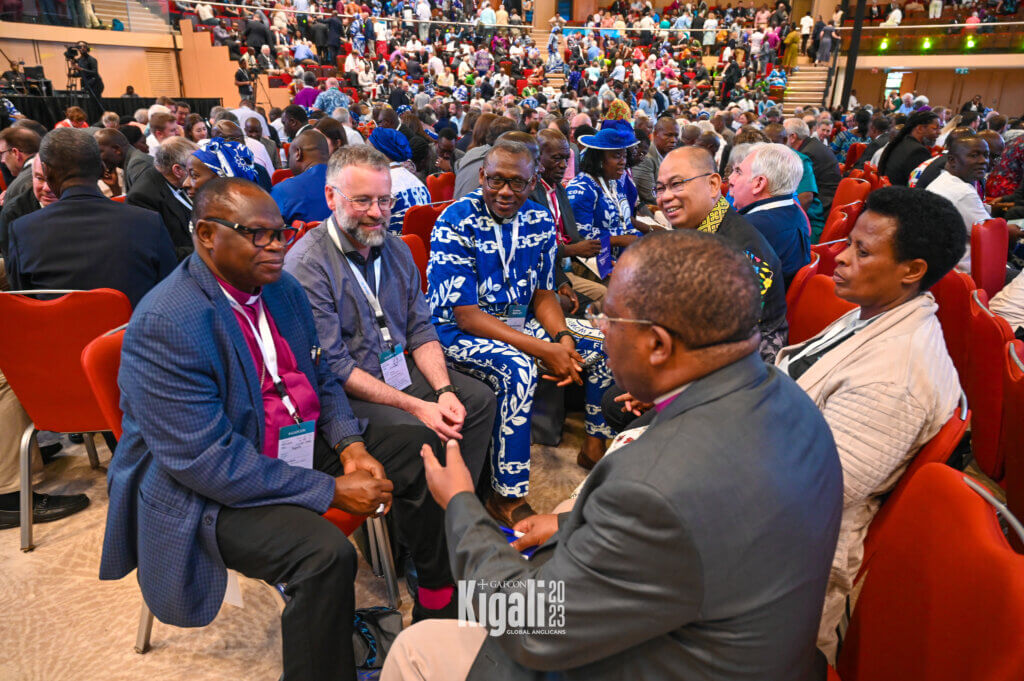by the Very Rev. Andrew Rowell
What exactly do we, who gather at GAFCON, desire for the future of the Anglican Communion? That question is bouncing around in my mind as I’m here at GAFCON IV in Kigali, Rwanda, where I’m blessed to be both a delegate from the Gulf Atlantic Diocese (ACNA) and an attentive observer in my capacity as a member of the Board of Trustees of the AAC. As it has done since 2008, the Global Anglican Futures Conference calls faithful Anglicans from all over the world to renew our commitment to an orthodox, Gospel-centered faith and to resist the growth of heresy within the churches in the West.
But how, exactly, do we propose to do so?
One way in which GAFCON strives to renew mission in the Communion is by creating a venue for the formation of Gospel-centered relationships. Put another way, GAFCON has a particular charism, a distinct spiritual gift, to offer the Communion, in that it is the body that recognizes and authenticates orthodox Anglicanism around the world and brings representatives of this global fellowship together for the sake of the Gospel. We all know there is a Gospel deficit within the Communion, a deficiency that arises from the failure of Anglican churches in the West to remain faithful to the Word of God and God’s call to reach the lost with the Gospel of Jesus. Within the GAFCON movement, that deficit is shored up – as clergy and lay people from across the globe gather to worship Jesus, proclaim the truth of God’s Word, partner together, encourage one another, and commit ourselves anew to take the Gospel of Jesus to a world in desperate need of the good news.
Those who gather at GAFCON, however, instinctively know we need something in addition to such missional fervor. While there is no doubt we’re ready to be set free to proclaim an unadulterated, biblically-sound Gospel, we also need to build good and godly systems of governance if we are truly going to be a reformed Anglican Communion unleashed to do God’s purposes. Maybe it’s the nerdy canon lawyer in me, but in the midst of enjoying sound teaching and beautiful worship, I always wonder – what will we do if we, led by this Spirit-filled GAFCON movement, one day break free from the shackles of heterodoxy but cannot respond the next time heresy rears its head? Put another way, while we have good checks and balances in parishes (between rectors and vestries), in dioceses (between bishops, standing committees, and synods), and in Provinces (between bishops and councils and assemblies), we have no such checks and balances at the level of the Anglican Communion. As we all know far too well, there has never been any clear way to discipline a wayward Province (such as TEC and now the Church of England). So, as we renew and rebuild the Communion in this reformation moment, what shall we do to solve this ecclesial deficit, this failure of church structures to provide holy limits to orthodoxy for the sake of missional flourishing?
I was particularly encouraged by the afternoon session on the first full day of GAFCON, where the clergy and lay delegates to this year’s conference were asked to answer the following prompt: “Our hope for the Anglican Communion is…..” Delegates broke into groups of six to eight delegates and developed responses to that prompt. As groups then shared their answers aloud, consistent themes arose. Orthodox Anglicans long to be unshackled from the Instruments of Communion (of which there are four: the Archbishop of Canterbury, the Anglican Consultative Council, the Lambeth Conferences, and the Primates Meetings), for they no longer represent unity built upon the Gospel of Jesus but rather a tired allegiance to an old colonial system whose time has passed. GAFCON delegates also expressed a desire that our life as a global community of Christians be founded upon the Word of God and not upon a constant attempt to appease the ever-changing winds of culture. But there was also a third drumbeat, as delegates asked for assurances that we will not wind up in this same place again. Delegates asked more than once – will there be canonical structures to defend and discipline this work of renewal in which we are all engaged?
It is my every prayer that the answer to this last question will be yes, and those canonical structures are already well underway in the ecclesial structures proposed by the Global South Fellowship of Anglicans (GSFA). These structures include, for the first time in Anglican Communion history, a binding, enforceable covenant (called the Cairo Covenant), such that members can be disciplined for breaching it. In this, GSFA solves the ecclesial deficit felt for so long in the Anglican Communion, even as GAFCON lives into its gifting for shoring up the Gospel deficit we’ve all felt for far too long.
What do we all want at GAFCON?
We want a renewed church that can discipline itself for the sake of the good news of Jesus to the glory of God. So, while the days ahead of us at GAFCON will surely be full of beautiful worship and godly preaching, I pray also we will move closer to covenantal relationships that will aid the future Church in its longing to stay true to the faith delivered once for all to the saints.
Fr. Andrew Rowell is the Rector of Christchurch Montgomery. He has a passion for preaching and teaching God’s Word and for sending the church out into the world to proclaim the good news of Jesus Christ. Andrew also serves as the Dean of the Western Deanery of the Gulf Atlantic Diocese and is on the Board of Trustees for the American Anglican Council and the Anglican Relief and Development Fund.


